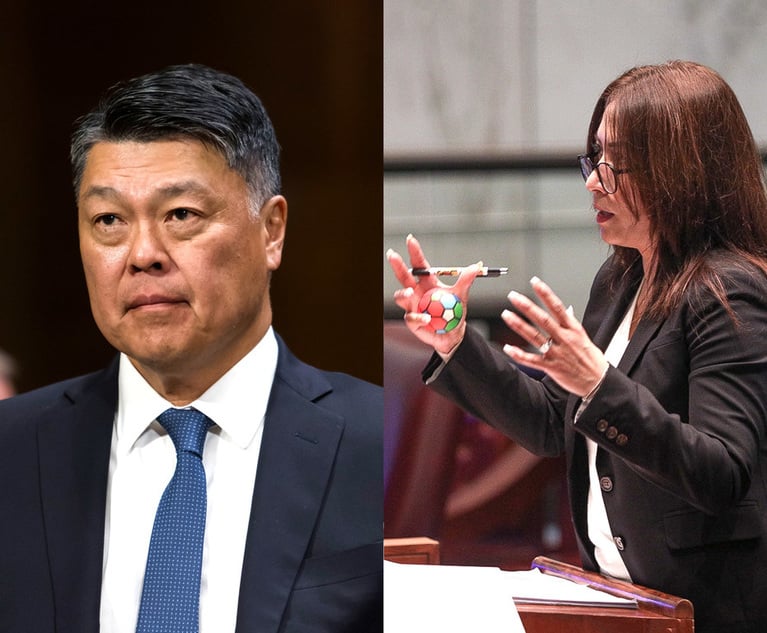A New Jersey federal judge has dismissed a suit by a former state jurist who sought to recoup $780,558 in earnings that she forfeited while fighting off criminal charges.
Carlia Brady claimed she was entitled to earnings withheld from her in June 2013 to March 2018, when she was suspended from her position as a judge in Middlesex County Superior Court.
But U.S. District Judge Edward Kiel ruled in Brady v. Sidamon-Eristoff that the Eleventh Amendment prohibits a federal court from considering a claim that a state official violated state law in carrying out his or her official responsibilities.
A few months after she became a judge, Brady was arrested and charged with official misconduct and hindering apprehension by the Woodbridge Police Department, which claimed she failed to assist them with the arrest of a man who was then her boyfriend, Jason Prontnicki, who was wanted on a robbery charge.
But the charges against Brady were dismissed after a lengthy court battle. While the charges were pending, she was suspended without pay.
Kiel said federal courts may not entertain a private party’s suit against the state unless the state has waived its immunity or Congress has permissibly abrogated it. Kiel said an exception applies when a private party sues a state official to prevent that person from violating federal law. But for that exception to apply, there must be an ongoing violation of federal law and a request for relief that can be properly characterized as prospective, Kiel said.
Citing case law from the U.S. Court of Appeals for the Third Circuit calling back pay “impermissible retrospective relief” that “necessarily depletes the state treasury,” Kiel wrote, “I see no reason to stray from this general principle and award plaintiff what is in all practical respects back pay.”
Another U.S. District Court judge, Georgette Castner, dismissed Brady’s back-pay suit without prejudice in 2023, citing Eleventh Amendment immunity.
But Brady’s attorneys refiled the suit, changing the defendants from the state judiciary and Chief Justice Stuart Rabner to the four individuals who held the position of state treasurer during her suspension.
Lawyers for the state called the swapping out of defendants “a superficial change.”
Kiel said the treasurers were added as defendants “presumably to establish a chain of custody of her allegedly withheld property” but said they “cannot be engaged in an ongoing violation within a position they no longer hold.” Though earlier actions may have present effect, that does not mean they are ongoing, he said.
Kiel’s decision was also made without prejudice.
Peter LaGreca and Timothy Smith of Caruso Smith Piccini in Fairfield. represent Brady. LaGreca said in an email, “the state remains unwilling to waive immunity and litigate on the merits of Ms. Brady’s cause, which we believe to be just and equitable. Clearly she has been wronged; and whether it is obtained through this path or another, Ms. Brady deserves relief. It’s just a matter of where that relief comes from. We are evaluating options and continue to stand by Ms. Brady in her just and equitable cause.”
The Attorney General’s Office declined to comment.
A Superior Court judge dismissed the official-misconduct charge against Brady in 2016. The two counts of hindering apprehension were dismissed by the state in 2018.
Brady’s suspension was lifted after the hindering charge was dismissed in 2018, and she returned to the bench. Her judicial career ended in April 2020 when she was not nominated for reappointment after her initial seven-year term concluded.
In August 2020, the Supreme Court ruled by a 4-2 margin that Brady violated the Code of Judicial Conduct when she failed to turn in Prontnicki.
The court agreed with a complaint from the Advisory Committee on Judicial Conduct that Brady failed to act in a forthcoming manner when police questioned her about Prontnicki’s visits to her home in 2013.
Brady’s suit against the judiciary claimed that its failure to pay her salary for nearly five years violated the No Diminution Clause of the New Jersey Constitution, which requires that judicial salaries “shall not be diminished” during the term of a judge’s appointment.
Brady is still pursuing a separate suit in federal court that accuses the Woodbridge Police Department and several of its officers of malicious prosecution in connection with the charges of official misconduct and harboring a fugitive.
NOT FOR REPRINT
© 2024 ALM Global, LLC, All Rights Reserved. Request academic re-use from www.copyright.com. All other uses, submit a request to [email protected]. For more information visit Asset & Logo Licensing.

 U.S. District Court Judge Edward Kiel, left, and Carlia Brady, right, former Middlesex County Superior Court judge. Photos: Diego M. Radzinschi and Carmen Natale/ALM
U.S. District Court Judge Edward Kiel, left, and Carlia Brady, right, former Middlesex County Superior Court judge. Photos: Diego M. Radzinschi and Carmen Natale/ALM









